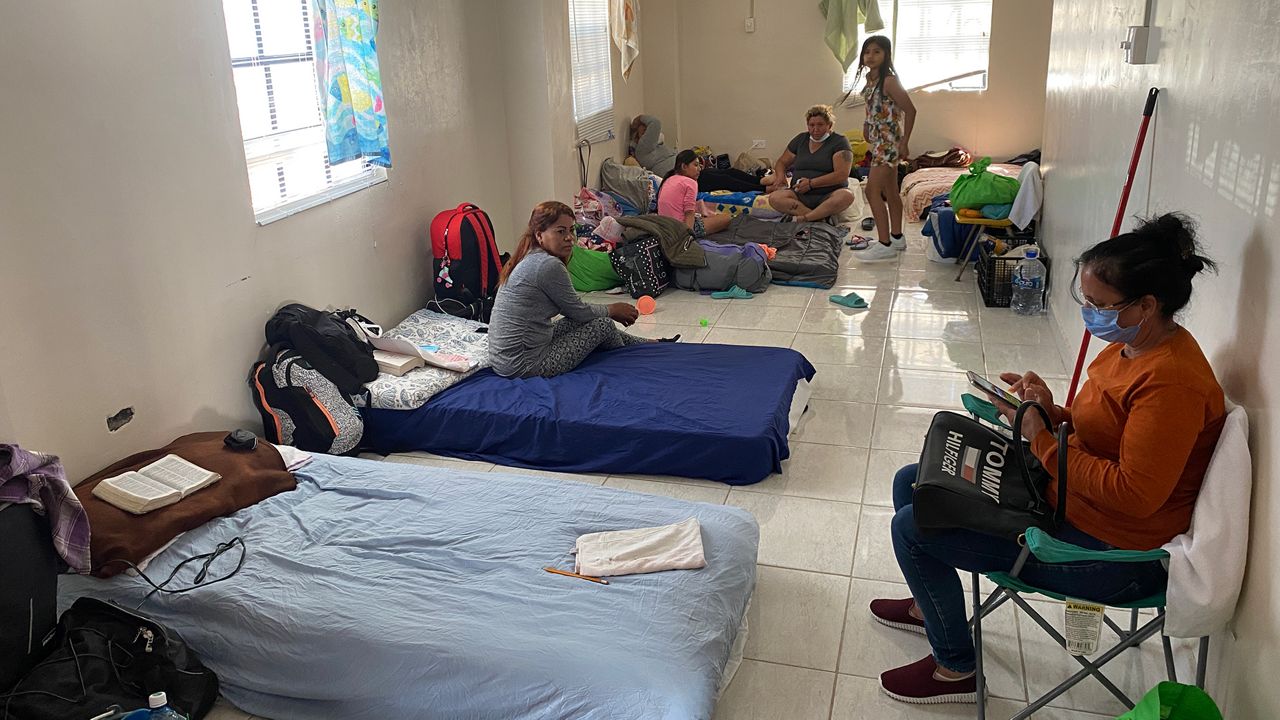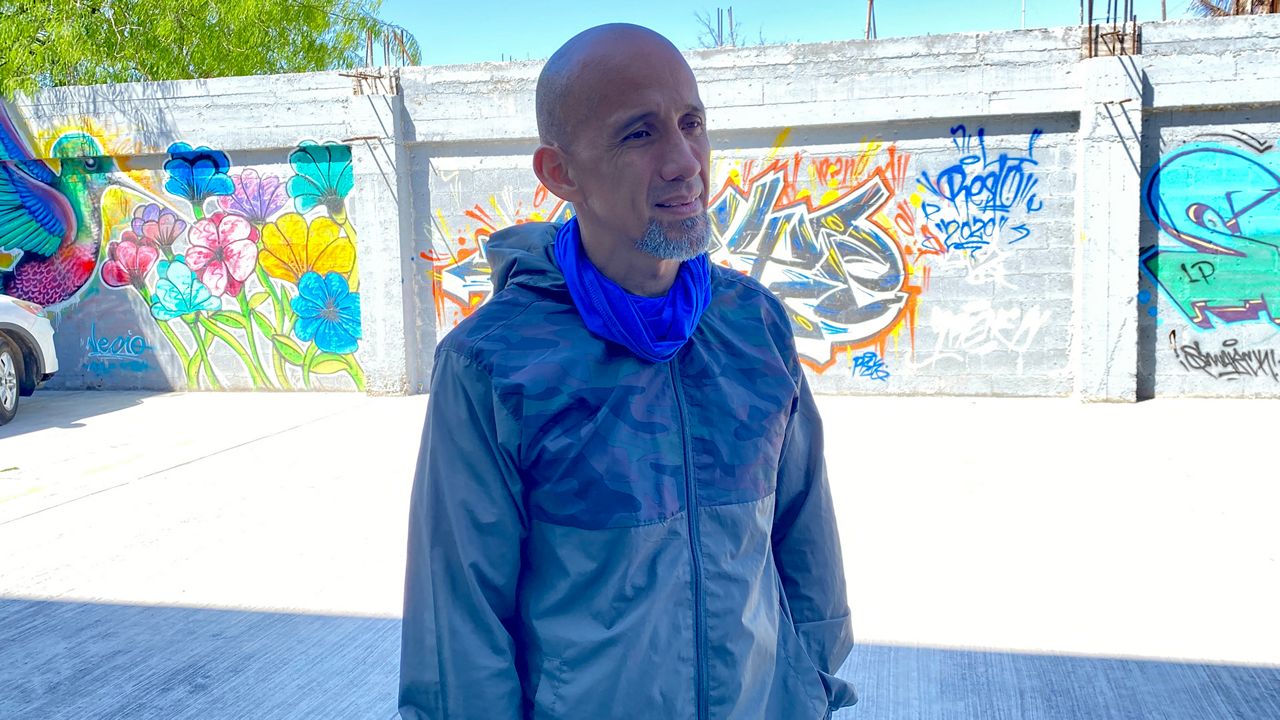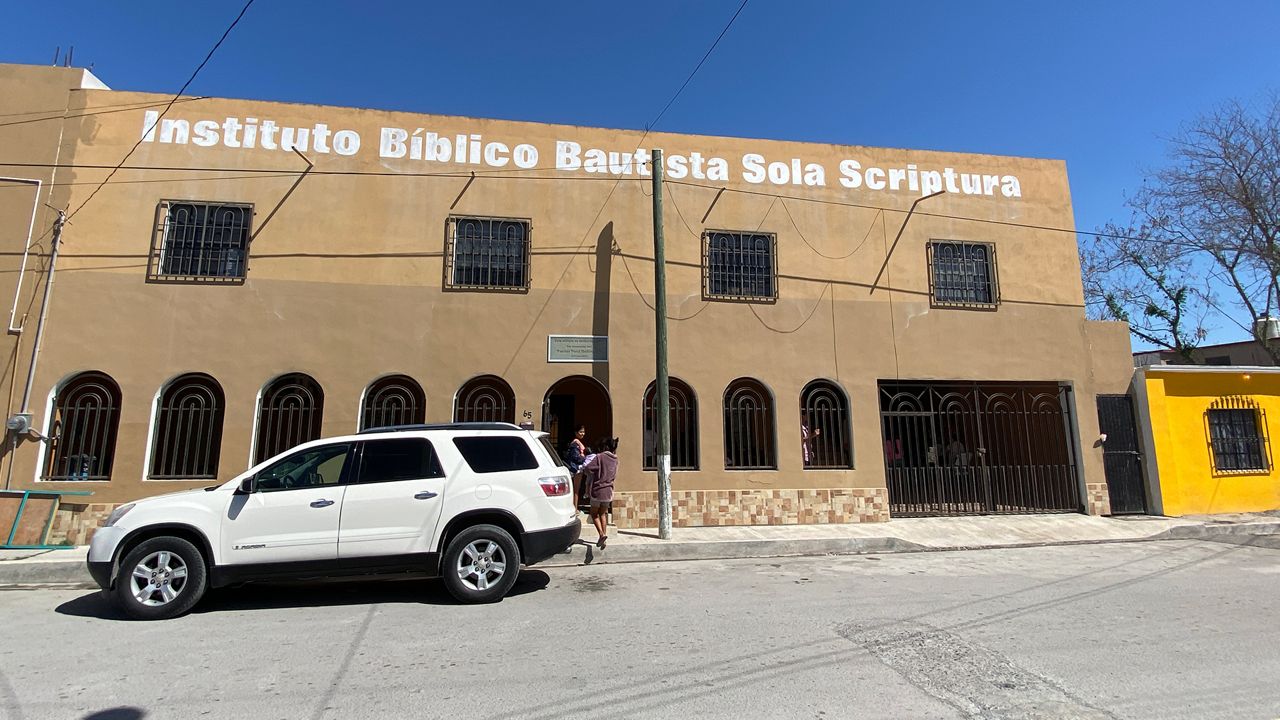MATAMOROS, Mexico — In his previous life, Pastor Abraham Barberi was part of a Mexican cartel and, by his own admission, sold drugs, drank too much, and associated with violent criminals.
Today, Barberi is housing and feeding more than 80 migrants, all of whom have turned up on the doorsteps of his ministry in this border town in the last two weeks looking for refuge. Rooms previously used for Bible study are now dormitories for migrants. Meeting rooms have become storage for baby formula, diapers, and canned foods.
This has created a problem that, at the moment, is more pressing than the threat of Mexican organized crime, Barberi said.
“Water,” he said, as he watched some of the migrants help roll a 2,000-gallon empty water tank into place to prepare it for filling and eventually, connecting it to the building’s plumbing.
“This building’s water supply is not built to serve this many people, all of whom need to wash themselves, their clothes, their dishes, and flush the toilets,” he said. “My biggest concern right now is how to get more water flowing.”
The migrants sheltering in Barberi’s Bible Institute facility are part of what U.S. immigration officials worry could be the next big surge of Central Americans and Mexicans trying to cross the border and flooding the immigration system.
They have arrived at the Texas-Mexican border at a time when the U.S. is already seeing a significant uptick in crossings this year, despite a message from the White House that the border is not open for migrants or asylum cases not already in the system.

U.S. Customs and Border Protection reported more than 100,000 encounters along the southwest border in February, a 28% increase from the month before.
The alarming number of unaccompanied minors has overwhelmed immigration agencies. President Joe Biden has had to direct the Federal Emergency Management Agency (FEMA) to help shelter and transport thousands of minors to converted convention centers and a former oil workers' camp in Texas to accommodate the youth until vetted sponsors can be found.
The U.S. border remains closed to new asylum cases since former president Donald Trump closed it in March 2020. Still, Biden has said the U.S. will not turn away unaccompanied minors or families, meaning thousands who cross illegally and turn themselves in are admitted and processed.
While last month’s border encounters were fewer than the huge migrant crossings in 2019, Homeland Security Secretary Alejandro Mayorkas warned this week that the U.S. could see a rate of crossings at the southern border this year greater than what we have seen in the past two decades.
Texas’ Rio Grande Valley, just across the border from Matamoros, has become the epicenter of a political challenge for Biden, who took office in January promising that his administration would take a more humane approach to immigration reform.
It’s here on the Texas-Mexico border that thousands of migrant families are crossing the Rio Grande River, many of them illegally. Most single adults are turned back by Border Patrol, but the White House has said it will not reject families and unaccompanied minors.
Republicans have seized the images of children being sent over in rafts across the Rio Grande River as fodder for what they are calling “Biden’s border crisis.”
Some 25,000 asylum seekers are being processed and allowed to cross as part of a Trump-era program called Migrant Protection Protocols, or MPP, which forced asylum seekers to wait in Mexico for their U.S. asylum case court date. Trump suspended all pending MPP hearings in March, creating a backlog of thousands of migrants stuck living in a tent camp along the border.
In late February, Biden announced the reopening of pending MPP cases and those cases have slowly been making their way through the system, allowing thousands of asylum seekers to cross into the U.S. legally.
The Mexican government wanted the Matamoros tent camp next to the border crossing closed, but the migrants living there, many of them for almost two years since Trump instituted the MPP program, didn’t want to leave.
That’s when Barberi got involved, albeit reluctantly.
Barberi’s Bible Institute is part of the larger One Mission Ministries, which focuses on spreading the Gospel, help set up new churches, and equip them to serve their congregations, and help the needy.
For two years since the Matamoros tent camp started as the Remain in Mexico policy forced some 3,000 migrants to camp on the border, Barberi has been assisting other non-governmental organizations in caring for the migrants with food, medical supplies, water, and clothing.
The humanitarian assistance services took their toll on Barberi after many months and thousands of dollars in fundraising. His own congregation, initially cooperative in their Christian duty to help those in need, began feeling neglected. Barberi knew he needed to get back to his main mission of tending to his own flock.
He was relieved that the tent camp was emptying out and many of the migrants crossed over to the U.S. but was hesitant when Mexican officials and the U.S. consulate asked him to help persuade the last 56 migrants to leave the camp and find shelter elsewhere or be forcefully removed by Mexican police.
The migrants trusted Barberi, they told him. Barberi said he tried, but the migrants feared that if they left the camp, their pending MPP cases would never be reviewed.
“So, I just said, come on, come with me. And that’s how this started, about two weeks ago,” he said. “But then more came. Now, we have 80 people here and we are at capacity.”
Of the 56 from the initial group, only nine remain. The rest are newcomers who have received his name via migrant word-of-mouth.
Barberi is weary at this point but recognizes that he is, for many of them, the only option. As a Christian, he believes it is his duty, even a calling, to help them. But there are physical and logical limitations to housing them.
Like making sure there’s enough water to keep everyone clean, particularly in a pandemic.

Barberi turned his life around 30 years ago when, after years of dealing drugs and violent crime, he found himself searching for something. What he found was a Christian church and eventually, Jesus, he said. He completed his education at a Bible college and eventually earned a master’s in theology.
In 2009, when the Mexican cartel wars were terrorizing the country, Barberi and his wife moved back to Mexico from the United States, Matamoros was a calling, he said.
“It was a really violent and dangerous time, but I felt I had a role here,” he said. Along with his wife, he established One Mission Ministries and began setting up other Christian churches in a very Catholic country. There were encounters with the cartels, but luckily nothing violent.
The organized crime gangs know what his mission does, but he believes they leave him alone because his focus has been on helping people, he said.
Barberi, now 53, understands the terror that organized crime imposes on a society, which perhaps he said gives him a unique ability to sympathize with desperation and fears plaguing the migrants now sheltering in his ministry, especially the parents of young children.
Most of them have fled violent gang warfare, murder, and political persecution in countries like Honduras, Guatemala, and Cuba. Recently, there has been an increasing number of migrants seeking help from Barberi from the Mexican states of Guerrero and Chiapas, two southern states along the Pacific coast notorious for organized crime gangs and violence.
All of the migrants have the same goal: to cross into the U.S. legally to claim asylum. Those who lose patience take the risk of hiring a smuggler to guide them across the Rio Grande River illegally in a raft.
Biden said this week in an interview with ABC that those thinking about making the arduous trek across Central America and Mexico to the U.S. border should stay home until the U.S. can rebuild a working asylum system, which his administration says Trump dismantled.
Barberi doesn’t think anyone will listen and more are on their way. He wishes the U.S. would do a widespread media campaign in Spanish to explain the situation more clearly, so that they would understand that they, too, will end up either waiting on the border for months or years or risking their and their children’s lives by doing it illegally.
“I tell them this isn’t a shelter, and they shouldn’t think of it that way,” Barberi said about his facility and its limited resources.
Meanwhile, the pastor and his staff, some of them also former cartel members who found salvation in the church, are moving things around the Bible Institute to find more room for those who might come.
The facility may be able to handle 20 more, for a maximum of 100. After that, Barberi won’t be able to take any more souls in, he said.



